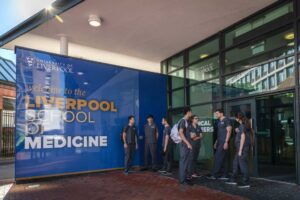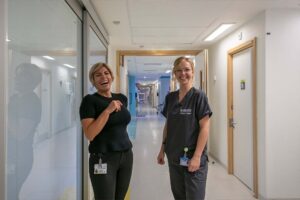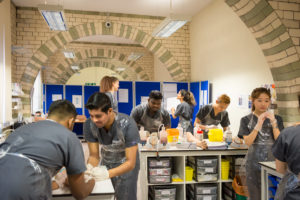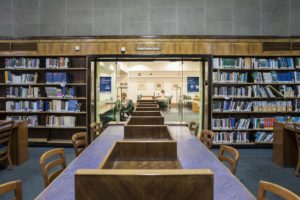Medicine and Surgery
UCAS code A100
- Study mode
- Full-time
- Duration
- 5 years
- Start date and application deadlines
-
- Start date
- September 2025 September 2026
- Apply by:
- Starts on:
UCAS code A100
We've set the country or region your qualifications are from as United Kingdom.
Study medicine at Liverpool and prepare to deliver outstanding patient care, in both current and future healthcare systems. Learn how to apply a compassionate, evidence-based and patient-centred approach to your clinical practice as a doctor. The main medicine programme is our A100 ( 5-year) programme but graduates with home-status may consider their eligibility to apply to our A101 (4-year) programme which is re-opening in August 2024 and is currently open to applications via UCAS.
Your interest and skill in medical scholarship will be actively developed with us, underpinned by a vision to harness expertise from far and wide. You’ll learn the necessary knowledge, skills and professional behaviours to safely and ethically practice medicine.
Our students benefit from GP-led small group teaching sessions, access to some of the best specialist clinical units in the UK, and enhanced learning opportunities through our state-of-the-art facilities.
We ensure our graduates are able to meet the core requirements set out by the General Medical Council, and become lifelong learners committed to their own professional development.
Programme in detail
The curriculum is delivered under a spiral model, under which concepts are introduced at an appropriate level, and revisited with increasing levels of complexity as the course progresses.
The curriculum is organised and delivered through a number of supra-themes, which fall into specifically defined themes.
In years one and two, all students follow the same lecture timetable, and are allocated to smaller groups for workshops, seminars and practical skills (eg clinical skills and anatomy) sessions. All teaching in year one takes place on the University of Liverpool campus.
Throughout years two-five students undertake clinical placements. Local NHS Trusts, GP practices, hospices, specialist services and community services deliver the placement components of the programme. Each hospital placement takes place at one, or more, of the North West hospital sites. During the course of their studies, students will be expected to rotate through the different clinical providers for variable lengths of time, dependent upon placement block requirements and length. This block rotational model has been designed to allow improved student ability in managing transitions and working across different clinical environments to help prepare them for junior medical postgraduate training.

We’re proud to announce we’ve been awarded a Gold rating for educational excellence.
Discover what you'll learn, what you'll study, and how you'll be taught and assessed.
The aim of the first two years is to ensure that students have established a core knowledge base, skills and understanding, fit for learning in the clinical environment and their future careers.
In years one and two, the emphasis of the programme’s study is on basic and clinical sciences. These are taught using an integrated ‘Systems’ approach. Each System Block includes physiology, biochemistry, pathology, microbiology, immunology, pharmacology and anatomy, genetics and cell and molecular biology. The emphasis of year one teaching is on the structure and function of the human body under ‘normal’ conditions. Teaching is delivered by lectures, practical and small group sessions and clinical skills sessions (where students will learn how to examine the components of the systems studied, as well as take part in simulation exercises). Communication for Clinical Practice sessions in small groups with simulated patients prepare students for the clinical placements. Students in year one also take part in a unique leadership development course, which is run in collaboration with 208 Field Hospital.
Please note that the programme detail listed is illustrative only and subject to change. The MBChB programme is non-modular programme, and all components of the MBChB are mandatory.
Programme details and modules listed are illustrative only and subject to change.
In year two, the integrated ‘Systems’ teaching approach, begun in year one, is expanded to enable students to understand abnormality and illness-related change and the interaction with the environment. Secondary care placements also start in year two as an experiential programme, with specific hospital-based tasks, recorded in our e-portfolio, aimed at enabling student to integrate safely into the clinical environment and begin to apply theoretical knowledge, skills and professional behaviour in clinical practice.
Alongside preparing students for clinical practice, the first two years of the programme also introduce students to the foundations of research.
Programme details and modules listed are illustrative only and subject to change.
Years three and four have an increasing focus on the application of skills learnt in the first two years of the programme into clinical practice, across a range of core and increasing complex clinical presentations and encounters.
In year three, students gain exposure to the key principles of medicine and surgery, with the focus on understanding core clinical concepts.
Students spend a series of four-week blocks on clinical placement, where each placement block is preceded by an ‘Academic‘ week. This week incorporates approximately 1.5 days of lectures delivered to the whole cohort, and then rotation-specific teaching, eg pre-placement sessions, Community Clinical Teaching (Primary Care), clinical skills preparation, simulation sessions and time for student-led Research and Scholarship projects. This ‘Just in time’ approach to teaching, which encourages students to revisit and develop knowledge and skills just before they are needed, prepares students to learn to recognise health problems, develop the skills needed to diagnose illness and disease, and manage patients.
Students rotate through a variety of integrated hospital and community-based settings in order to complete placements. Students are expected to participate fully in clinical care in these settings, both through timetabled activities and additional opportunities (in agreement with supervising clinical staff). All of these placements provide opportunities (and expectations) to work with clinical teams and care for patients in a variety of healthcare settings.
Programme details and modules listed are illustrative only and subject to change.
In year four, the combination of academic weeks and placement blocks is again used to provide students with more specialist and challenging placement experiences, including a focus on mental health, specialist placements in neurology, paediatrics and obstetrics and gynaecology and a nationally-recognised placement of excellence in palliative care.
At the end of year four, students are also able to undertake a four-week elective. Many students choose to study abroad during this period.
Programme details and modules listed are illustrative only and subject to change.
The final year is spent gaining intensive clinical experience in hospitals and the community to students transition successfully and begin work as a doctor.
Students experience Emergency and Acute Medicine, Surgery, GP and Psychiatry placements during this year, and have a ward shadowing experience block that allows them to consolidate complex clinical skills and professional attributes required of them for their Foundation Year post. Students are also able to undertake a five-week research project such as an audit or Quality Improvement Project, a community based project or a specialist placement of their own choosing.
Placement experiences are supported by academic “Preparation for Practice” weeks, support for the required national examinations and a full week of interprofessional simulation, ensuring students are able to demonstrate the skills need to deliver complex, acute care within a multi-professional team.
Programme details and modules listed are illustrative only and subject to change.
The School uses an integrated teaching model. The learning of medical sciences is enhanced by the clinical context of a systems-based approach. The development of understanding of clinical practice is supported by a ‘just in time’ model of academic weeks that relate to each clinical placement and case-based teaching within each placement. Specialist clinical centres from across the region provide students with a wide range of exceptional placement experiences during which students complete structured learning activities as well as taking advantage of near patient learning opportunities.
The School is at the forefront of technology enhanced learning, utilising mobile learning, virtual reality, simulation and a personalised e-portfolio to provide our students with the best possible experience and prepare them for the technological developments that will shape their future careers in healthcare.
We take the development of clinical leaders seriously and use a programme of experiential learning opportunities to develop students’ leadership and followership skills in a range of situational contexts.
The remainder of the course is delivered using a mix of interactive and didactic lecturing; case based learning, small group teaching, clinical skills and simulation workshops, Human Anatomy Resource Centre (HARC) sessions, communication skills practicals and a staged programme of research skills development.
The breadth of learning and teaching activities used within the Medical School ensures students have the underpinning knowledge and skills to become the safe clinical practitioners of tomorrow.
Both formative and summative assessment take place within the programme. There is an emphasis on assessment for learning through the use of subject specific tests such as quizzes, anatomy spotters and formative Objective Structured Clinical Examinations (OSCEs).
Summative assessment takes place at the end of each year and includes written papers and practical exams in the form of OSCES and LOCAS.
We use technology to facilitate online marking and annotated feedback of written assignments, deliver formative online tests for students at the end of each teaching block and collate and deliver OSCE data, providing students with more useful feedback as a result.
A bespoke electronic portfolio, integrated throughout the curriculum provides students with a personalised learning space where they can collect evidence and develop their skills through reflective activities. The e-portfolio charts the student learning journey over the course of the programme.
We have a distinctive approach to education, the Liverpool Curriculum Framework, which focuses on research-connected teaching, active learning, and authentic assessment to ensure our students graduate as digitally fluent and confident global citizens.
The Liverpool Curriculum framework sets out our distinctive approach to education. Our teaching staff support our students to develop academic knowledge, skills, and understanding alongside our graduate attributes:
Our curriculum is characterised by the three Liverpool Hallmarks:
All this is underpinned by our core value of inclusivity and commitment to providing a curriculum that is accessible to all students.
Studying with us means you can tailor your degree to suit you. Here's what is available on this course.
University of Liverpool students can choose from an exciting range of study placements at partner universities worldwide.
Immerse yourself in Chinese culture on an optional additional year at Xi'an Jiaotong Liverpool University in stunning Suzhou.
Spend a summer abroad on a study placement or research project at one of our worldwide partner institutions.
Every student at The University of Liverpool can study a language as part of, or alongside their degree. You can choose:
Earn an additional undergraduate or master's degree by adding a year of intercalated study. Once you've completed your intercalation year - usually following your third year - you'll finish the rest of your programme.
The School of Medicine is one of the largest providers of medical education in the country. Students have access to facilities such as the unrivalled Human Anatomy Resource Centre and Clinical Skills Resource Centre, as well as our Virtual Learning Environment. We also offer access to a comprehensive placement network with nationally recognised centres of excellence.






From arrival to alumni, we’re with you all the way:
It really is great to be on the ward - and that’s how you learn. The Medical School is very good and very supportive. It’s definitely set me up well for my future career, and I’m looking forward to getting into the job.

Want to find out more about student life?
Chat with our student ambassadors and ask any questions you have.
Our programmes are for individuals who wish to become qualified medical practitioners. A diverse range of careers are open to you as a medical graduate, varying from medical science, perhaps laboratory-based research, through public health and the development of health care strategies to clinical practice in the hospital and community.
99% of medical students find their main activity after graduation meaningful.
(Graduate Outcomes, 2018-19.)
My qualifications are from United Kingdom.
Your tuition fees, funding your studies, and other costs to consider.
Full-time place, per year - £9,535
Full-time place, per year - £47,600
The tuition fees shown are correct for 2025/26 entry. Please note that the year abroad fee also applies to the year in China.
Tuition fees cover the cost of your teaching and assessment, operating facilities such as libraries, IT equipment, and access to academic and personal support. Learn more about paying for your studies.
We understand that budgeting for your time at university is important, and we want to make sure you understand any course-related costs that are not covered by your tuition fee. This includes the cost of a stethoscope, travel to placements, and any additional sets of scrubs.
The School provides some equipment free of charge, but students should expect to cover the following costs.
Lab Coat: Each student will be given a lab coat for use in the Human Anatomy Resource Centre free of charge. There is a £15 charge for any replacement lab coats.
Stethoscope: Students will need to purchase a stethoscope (approximately £90 plus).
Scrubs: Five sets of scrubs are issued per student during the programme. They are issued as follows: one set in year one and the further four sets in year two. If students require an additional set then they are required to purchase this themselves at a cost of £29.95.
Travel to Placements: Placement travel costs will vary from student to student. Some students in receipt of a bursary from the NHS may be eligible to claim placement travel related expenses from the NHS too. For students who are not in receipt of any other funding/reimbursement for placement travel, the School of Medicine is able to provide a contribution towards placement travel costs. This contribution is capped and the cap is established each year based on the funding available. As a guide, in academic year 2022-23, contributions were made on the basis of calculated public transport costs. The average total travel costs for primary and secondary care placements for one year of the programme was calculated as approximately £775. The average contribution towards these costs provided by the School for 2022-23 was approximately £595.
For academic year 2024/25, placement travel contributions will be based on actual expenditure.
Electives: Elective costs will vary from student to student and could include, travel costs to the placement, agency costs to find the placement, accommodation and living costs, and public liability insurance costs.
We offer a range of scholarships and bursaries that could help pay your tuition and living expenses.
If you’re a UK student joining an undergraduate degree and have a household income below £35,000, you could be eligible for a Liverpool Bursary worth up to £2,000 for each year of undergraduate study.
If you’ve spent 13 or more weeks in Local Authority care since age 14, you could be eligible for a bursary of £3,000 per year of study. You’ll need to be a UK student joining an eligible undergraduate degree and be aged 28 or above on 1 September in the year you start.
Are you a UK student with a Black African or Caribbean heritage and a household income of £25,000 or less? You could be eligible to apply for a Cowrie Foundation Scholarship worth up to £8,000 for each year of undergraduate study.
If you’re a UK student identified as estranged by Student Finance England (or the equivalent UK funding body), you could be eligible for a bursary of £1,000 for each year of undergraduate study.
Joining a School of Biosciences degree and have a household income of less than £25,000? If you’re a UK student, you could apply to receive £4,500 per year for three years of your undergraduate course.
Do you live in the Liverpool City Region with a household income of £25,000 or less? Did neither of your parents attend University? You could be eligible to apply for a Nolan Scholarship worth £5,000 per year for three years of undergraduate study.
Are you a UK student with a household income of £25,000 or less? If you’ve participated in an eligible outreach programme, you could be eligible to apply for a Rigby Enterprise Award worth £5,000 per year for three years of your undergraduate degree.
Are you a UK student with a household income of £25,000 or less? Did neither of your parents attend University? You could be eligible to apply for a ROLABOTIC Scholarship worth £4,500 for each year of your undergraduate degree.
Apply to receive tailored training support to enhance your sporting performance. Our athlete support package includes a range of benefits, from bespoke strength and conditioning training to physiotherapy sessions and one-to-one nutritional advice.
Joining a degree in the School of Electrical Engineering, Electronics and Computer Science? If you’re a UK student with household income below £25,000, you could be eligible to apply for £5,000 a year for three years of study. Two awards will be available per academic year.
If you’re a young adult and a registered carer in the UK, you might be eligible for a £1,000 bursary for each year of study. You’ll need to be aged 18-25 on 1 September in the year you start your undergraduate degree.
My qualifications are from United Kingdom.
The qualifications and exam results you'll need to apply for this course.
Please note that individuals applying to our Medicine programmes must consult our full guidelines.
Please note: Non-graduate applicants applying to the A100 programme must sit the UCAT admissions test. Graduates applying to the A100 programme are subject to different entry criteria. and are currently required to have taken GAMSAT. For further details please see www.liverpool.ac.uk/medicine/study-with-us/undergraduate/admissions-information
In the interests of public safety, and your own best interests, information pertinent to your educational achievements and to your fitness to practise may be shared by Liverpool Medical School with training providers, employers and regulatory organisations. In the event of termination of studies, student details are shared with regulatory bodies and other medical schools via the MSC Excluded Students Database. Any offer for the medical programme will be conditional on applicants having disclosed any previous fitness to practise findings against them.
| Qualification | Details |
|---|---|
| A levels |
AAA to include Chemistry together with either Biology, Physics or Mathematics and a third academic subject. Alternatively A*AB also accepted but the A* A grades must include Chemistry together with either Biology, Physics or Maths; and a B grade required in the third academic subject. If you don't meet the entry requirements, you may be able to complete a foundation year which would allow you to progress to this course. Available foundation years: |
| T levels |
T levels are not currently accepted. |
| GCSE |
9 GCSEs attained by the end of Year 11 which must include English Language, Mathematic, Biology and Chemistry (or Core & Additional Science, combined or triple science) at minimum grade B/6. A minimum score of 15 points from the best 9 GCSEs or equivalents (where A*/A/7/8/9 = 2 points; B/6 = 1 points). BTEC (Non-Science) Level 2 and OCR awards (Distinction*/Distinction = 2 points) BTEC (Non-Science) Level 2 and OCR awards (Merit = 1 point). Two points is the maximum score awarded in each subject area (e.g. only one of Maths and Further Maths). No more than two Level 2 BTEC qualifications or OCR awards will be considered as part of the 9 GCSEs/equivalents. These cannot be used as replacements for English Language, Maths and Science subjects. I.e. a minimum of 7 full GCSEs required |
| Subject requirements | A levels in three subjects taken at one sitting, usually after 2 years of study: at a minimum of AAA Chemistry together with either Biology, Physics or Mathematics and a third academic subject. Alternative offer conditions may apply. Please note that individuals applying to our Medicine programmes must consult our full guidelines. |
| BTEC Level 3 National Extended Diploma | Not acceptable in lieu of A levels. |
| International Baccalaureate | 36 points overall (at first sitting): Higher level (HL) a minimum of 6,6,6 to include Chemistry together with either Biology, Physics or Mathematics and a third academic subject. 5,5,5 at standard level (subjects not offered at HL) Alternatively, 36 points overall (at first sitting): Higher level (HL) a minimum of 7,6,5 but the 7 and 6 grades must include Chemistry together with either Biology, Physics or Mathematics in any order and 5 in a third academic subject. 5,5,5 at standard level (subjects not offered at HL) Generic advice on equivalency of your qualifications can be accessed above. However we advise that all international/EU applicants must consult our specific guidelines which can be found on our web-site at https://www.liverpool.ac.uk/medicine/study-with-us/undergraduate/admissions-information/
Many countries have a different education system to that of the UK, meaning your qualifications may not meet our entry requirements. Completing a Foundation Certificate offered by the University of Liverpool International College, may equip you with the qualifications which would allow a future application to be submitted to the A100 MBChB programme.
|
| European Baccalaureate | 83% average with no less than 83% in Chemistry and 83% in either Biology, Physics or Mathematics. |
| Irish Leaving Certificate | Six Higher Level subjects must be offered at a single sitting. Grades of H1 in two subjects to include Chemistry and either Biology, Maths or Physics. Grades of H2 in four further academic subjects. Subjects offered must include English Language, Biology, Maths or Physics if these subjects are not offered at GCSE equivalent (at a minimum of grade B/6). |
| Scottish Higher/Advanced Higher | Minimum of SCQF level National 5 (Intermediate 2) in Biology, Chemistry, Physics, English Language, Mathematics, and at least two others attained by the end of S4. Highers (SCQF level 6) in five subjects taken at one sitting after 1 year of study: comprising Chemistry and one of either Biology, Physics and Maths; minimum of AAAAB. Advanced Highers (SCQF level 7) in Chemistry and one of either Biology, Physics and Maths at grades AA. |
| Welsh Baccalaureate Advanced | The Advanced Welsh Baccalaureate Skills Challenge Certificate is accepted in lieu of a third academic subject. |
| Cambridge Pre-U Diploma | D3, D3, M1 acceptable in principal subjects with D3 in Chemistry together with one of Maths, Biology or Physics. M1 usually acceptable in third academic subject. Up to two A levels at A grade may be substituted for Principal Subjects. |
| AQA Baccalaureate | A (Chemistry); A (Biology); A (third A level). |
| Access | Specified Access to Medicine courses acceptable (see our Admissions page for more information). |
| Work Experience Requirements | If applying to our medical school you are advised, as a minimum, to read the ‘statement on the core values and attributes needed to study medicine’ and ‘work experience guidelines for applicants to medicine’. These guidelines can be accessed via the Medical Schools Council web-site. In response to COVID-19 ‘Guidance on gaining relevant work experience to study medicine during the pandemic’ has been created. |
| Duty of Care | Applicants to programmes in the School of Medicine should be aware that the professional body governing the practice of medicine (The General Medical Council) has specific requirements relating to the protection of both staff and patients. Students will be required to undertake an enhanced Criminal Records Bureau (CRB) check, undergo an occupational health check and be tested for and/or immunised against a range of infectious diseases prior to patient contact. See the General Medical Council website and the archived Department of Health guidance document. |
| International qualifications |
Many countries have a different education system to that of the UK, meaning your qualifications may not meet our entry requirements. |
You'll need to demonstrate competence in the use of English language, unless you’re from a majority English speaking country.
We accept a variety of international language tests and country-specific qualifications.
International applicants who do not meet the minimum required standard of English language can complete one of our Pre-Sessional English courses to achieve the required level.
| Qualification | Details |
|---|---|
| IELTS | 7.0 overall, with no component below 7.0 |
| TOEFL iBT | 100 overall, with minimum scores of L24 W24 R24 and S26. TOEFL Home Edition not accepted. |
| TOEFL Paper | Grade 7 at Higher Level |
| Pearson PTE Academic | 69 overall, with no component below 69 |
| Cambridge IGCSE First Language English 0500 | Grade B overall, with a minimum of grade 2 in speaking and listening. Speaking and listening must be separately endorsed on the certificate. |
| Cambridge IGCSE First Language English 0990 | Grade 6 overall, with Merit in speaking and listening |
| Cambridge IGCSE Second Language English 0510/0511 | 0510: Grade B overall, with a minimum of grade 2 in speaking. Speaking must be separately endorsed on the certificate. 0511: Grade B overall. |
| Cambridge IGCSE Second Language English 0993/0991 | 0993: Grade 6 overall, with a minimum of grade 2 in speaking. Speaking must be separately endorsed on the certificate. 0991: Grade 6 overall. |
| LanguageCert | Grade 6 at Standard Level or grade 6 at Higher Level |
Have a question about this course or studying with us? Our dedicated enquiries team can help.
Last updated 27 March 2025 / / Programme terms and conditions